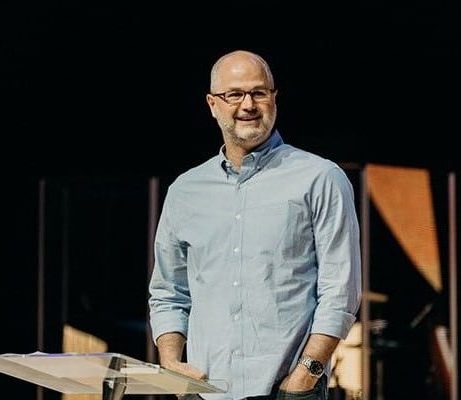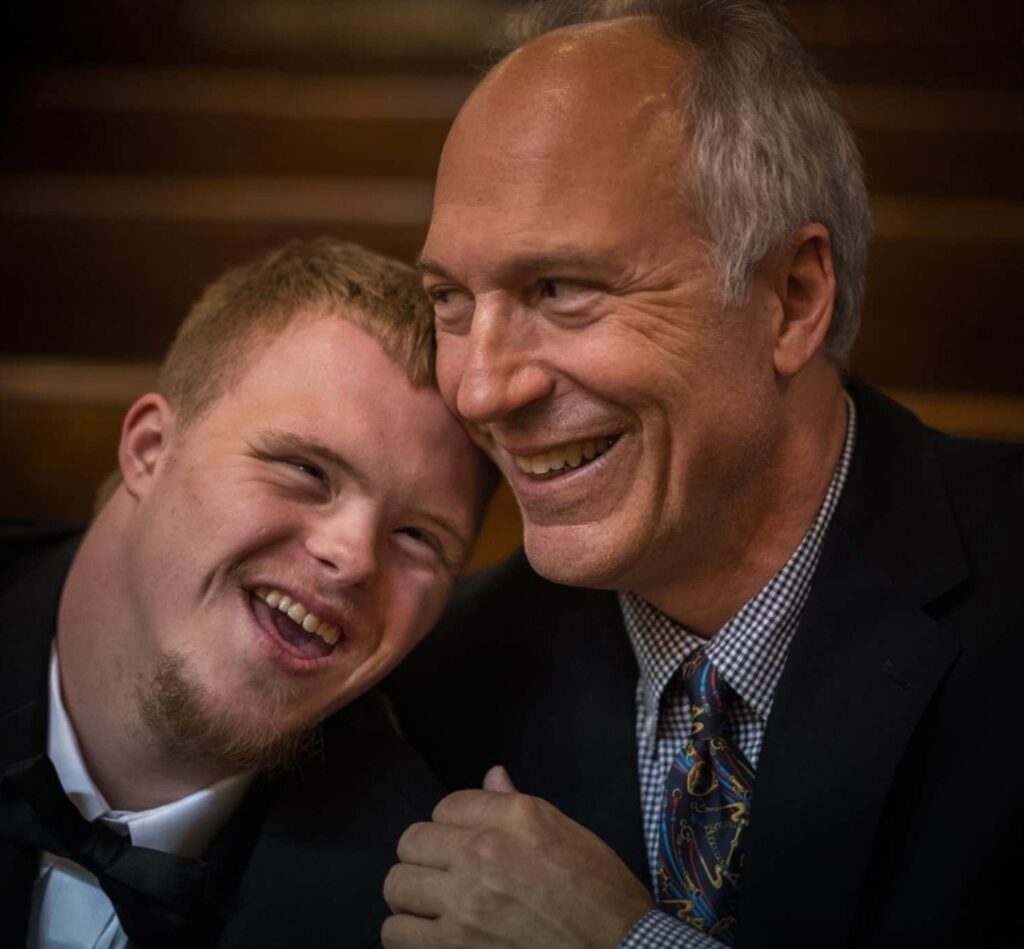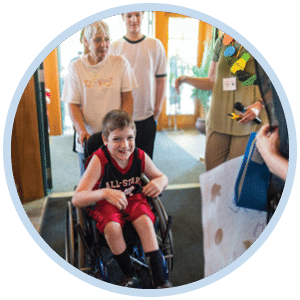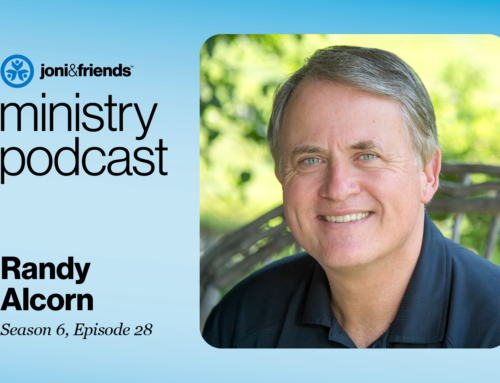Creating Belonging in the Church for People with Disabilities
Subscribe to the Joni and Friends Ministry Podcast
“If we walk in the light, as he is in the light, we have fellowship with one another…”
1 John 1:7
God created human beings with a deep need for belonging. For people who believe in Jesus, the church should be a place of belonging and fellowship.
But for marginalized people—like those with disabilities—does the body of Christ live up to its calling to embrace and include every member?

Pastor and author Scott Sauls returns to the Joni and Friends Ministry Podcast to talk about how to create belonging in an era of fear and isolation.
In addition to decades of experience as a pastor, Scott draws from the example of Christ himself, and how he prioritized marginalized people throughout his ministry on earth, to demonstrate the importance of embracing people with disabilities as a vital part of every church community.
Pastor Scott has seen firsthand how a robust ministry to people with disabilities—not only welcoming them but evoking their gifts—catalyzes the life of a church. His church in Nashville prioritizes including and involving individuals and families living with disability. He described the annual Vacation Bible School the church hosts specifically for people with disabilities:
“It’s a three-day event with two hundred to three hundred volunteers serving people from the church and the community who live with disabilities. The kids have a lot of fun, learn Bible stories, and get teaching from Scripture.
At the same time, parents get a few hours for three consecutive days—respite time—which is a very rare thing for parents raising kids with special needs. The goal is to bless the whole family.”
To bless the whole family, Scott’s church acknowledges that caregivers often suffer from exhaustion.
Not only that but parents raising disabled children, and siblings, can face rejection or discomfort in community because of how people respond to their disabled family member.
The church can serve families by anticipating potential barriers to participation and integration, and work to overcome them.

When families feel safe, understood, and appreciated in a church, they can show up and be themselves. This creates a tangible sense of acceptance and belonging. Pastor Scott’s emphasis on including and embracing marginalized people in the body of Christ stems from Christ’s actions, heart, and ministry. He says:
“I think any church focused on Christ and his work will quickly recognize how Jesus Christ is present and drawn to marginalized people and communities, like people with disabilities. He draws near to people who are living in a place of weakness—those who are overlooked or on the margins of society. Jesus had a special place in his heart, and a priority in his ministry, for such image bearers.
And, as believers, we want to draw close to whatever Jesus is close to; we want to take part in what Jesus takes part in. We see Jesus constantly healing people. Take the paralytic, or the man born blind. Jesus tends to people who have disabilities, whether we’re talking about spiritual or physical disabilities—or both! So we need to follow Jesus in this way.”
What are some ways to create a sense of belonging for people with disabilities in Christian community?
As Scott points out, creating true belonging goes beyond just creating a welcoming space; he suggests also providing avenues for meaningful service for people with disabilities. He gives examples from his own church:
“We serve communion every Sunday; in the middle of the week we have a dozen young men and women with Down syndrome and autism come in prepare the elements. And on Sunday, they also offer the elements to people when they come to take communion.
We have people with disabilities serving as greeters, handing bulletins to people, asking how they can help.”
In addition to receiving a warm welcome, disabled people, like everyone else, want to become integral to the life and ministry of the church.
“We’re always exploring different opportunities, not only to welcome and serve, but also to unleash the gifts, energies, and love that people with disabilities have to offer.
Like in a human family, as part of the family of God and the church, everybody receives care and love, but each member also contributes and gives back. Every believer has spiritual gifts, and the church can love and dignify people by allowing them to use their gifts for the good of the body of Christ.”
And Scott has seen churches that emphasize serving people with disabilities grow and thrive in amazing ways. Why? He says,

“When the people of God get close to the things that motivated Jesus, it has a renewing and reviving effect on the community. Jesus draws near to the weak, and often channels his strength and his power through the very people and communities who the world sees as weak.”
At the same time, Scott knows that serving individuals and families with disabilities can require a lot: resources, time, and energy.
What barriers do you or your church face when it comes to serving or connecting with people with disabilities?
Some pastors don’t see the barriers that keep people living with disability from their churches. Have you ever heard a church leader say something like the following (or said them yourself)?
- “We just don’t have anybody with disabilities at our church.”
- “If someone with a disability showed up at our church, we would care for them; until then, we won’t think about it.”
- “We don’t do disability ministry right now.”
- “We’re just not called to disability ministry.”
- “We don’t have the budget for disability ministry.”
If you or your church struggle to find resources to serve people with disabilities, Joni and Friends can help! In addition to online resources, blogs, and podcasts episodes for disability ministry leaders, the Joni and Friends team provides mentorship and advice to anyone looking to build or support a disability ministry.
What does Scott say to leaders or churches hesitant to serve the disability community?
First: “Serving people who have disabilities is a profound blessing.” Every church failing to include people with disabilities robs the body of Christ of an essential and meaningful aspect of serving Jesus and spreading the Gospel.
When if comes to the affordability and budget questions, Scott points to the story of Jesus feeding the crowds, as recounted in Matthew 14:15–21:
“As evening approached, the disciples came to him and said, ‘This is a remote place, and it’s already getting late. Send the crowds away, so they can go to the villages and buy themselves some food.’ Jesus replied, ‘They do not need to go away. You give them something to eat.’ ‘We have here only five loaves of bread and two fish,’ they answered. ‘Bring them here to me,’ he said. And he directed the people to sit down on the grass.
Taking the five loaves and the two fish and looking up to heaven, he gave thanks and broke the loaves. Then he gave them to the disciples, and the disciples gave them to the people. They all ate and were satisfied, and the disciples picked up twelve basketfuls of broken pieces that were left over. The number of those who ate was about five thousand men, besides women and children.”
In this story, and throughout the Gospel, Jesus demonstrates that he can turn scarcity into abundance. Christ has five loaves of bread and two fish. He doesn’t need the disciples to do anything in terms of multiplying the resources; but he asks them to be available to serve the hungry people in front of them.
In the beginning of the story of the feeding of the crowd, the disciples are overwhelmed by the magnitude of the need. They look at the expanse of people, then at the little basket of groceries they have on hand. But they obey Jesus; and by the end of the process of handing out the food, everybody is fed to the brim and the leftovers are greater than the original amount of food.
When it comes to feeding the hungry, or to disability ministry, Scott reminds leaders that
“All [Jesus] asks of us is that we lean in, make ourselves available, and tend to those God puts in front of us.”
And this applies to every church, large or small. As believers step out in faith to obey Jesus, he promises to provide for every need that arises.
How can you trust God’s abundance and step out in faith today?

Become a Church that Embraces People with Disabilities
Joni and Friends provides church training resources to help you welcome and embrace people with disabilities. See how you can start or grow your disability ministry!








